Mumbai (Bombay), India (1/28-29/2013) – Mumbai is the largest city in India offering amazing contrasts
- everything exotic and chaotic from India!

Please enjoy 250+ wonderful places around the world, with award-winning photos, from our BLOG ARCHIVE on the right ---->
 |
| Pat Enjoying the Colors and Smells of Mumbai, India |
The sights
and smells of India hit you as soon as you arrive. Even at midnight leaving the
Mumbai Airport to find our taxi, the interesting smells engulf you initiating
you to your new world like making a new friend. When visiting Mumbai, be ready
for chaos meets modern urban society.
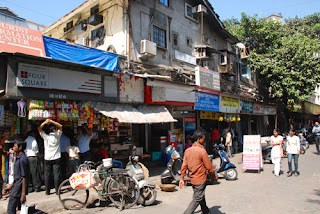 |
| Low Income Area - Mumbai, India |
 |
| High Income Area - South Mumbai, India |
Mumbai, the largest and richest city in
India, is an illustration of astounding contrasts. Literary, in the very shadow
of millionaire high-rise condos, people live in slums surviving each day on
what their rich neighbors spend on morning breakfast. But you can stroll
through those slums without fear that would be reasonable in many other cities
of the world. Obviously apparent, India is a young country with a large amount
of its population below the age of 30. In this largest city in India, people
travel along infrastructure that is extremely overly congested making a living
however they can. The incredible thing is that Mumbai is a city that works.
 |
| Street Scene - Mumbai, India |
When
driving around the crazy horn-honking traffic in Mumbai, you would readily
conclude that the buildings, roads, and even main sights suffer from neglect
and much of the city looks like a developing country. At the same time, the
streets are clean and when you go inside many of the places, they are
surprising modern and beautiful.
Mumbai is considered
the most cosmopolitan city in India alluring people seeking a better life with
glamour represented by being the center of the Bollywood, the India’s
film and TV industries. Yet right in the middle and impossible to overlook, it
is home of Asia’s largest slum (Dharavi
– see photo) where half of Mumbai’s population live. You have probably seen this in the movie Slum Dog Millionaire.
 |
| Street in Dharavi Slum - Mumbai, India |
 |
| Dharavi Slum - Mumbai, India |
Interestedly,
the low-income housing is mixed among the higher income, not separated like in
many cities, and it winds around the high-rise buildings like a ribbon. This low-income
area has running water and electricity. In the mist of all this, the colors of
India are marvelous – the women in their colorful clothing, flowers, richly
painted buildings, and even the trucks. Color is everywhere and the food is
wonderful.
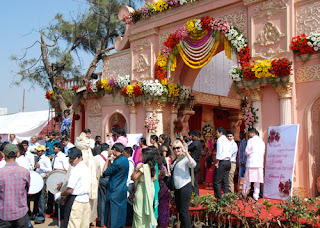 |
| Pat at Hindu Wedding - Mumbai, India |
A highlight
of our visit to Mumbai was mixing in a Hindu wedding. The women wear colorful
clothing and everyone dances before the wedding (see photo). They had no
problems of us joining in for a while – amazingly hospitable people.
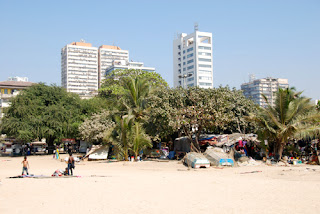 |
| Chowpatty Beach - South Mumbai, India |
Mumbai’s most common tourist sites are concentrated in Mumbai's
downtown area, South Mumbai. It is the
commercial capital of India where the richest neighborhoods in India are
located. The high-end real estate prices in South Mumbai are comparable to
those in Manhattan in New York. South Mumbai is home to most of Mumbai's
museums, art galleries, bars, and upscale restaurants.
We treated ourselves to a half-day
city sightseeing tour of South Mumbai. Here are some of the highlights you should consider
visiting or driving by to see:
 |
| Taj Mahal Hotel - South Mumbai, India |
Taj Mahal Hotel: We wandered through the famous Taj
Mahal Hotel (see photo) located across from the Gateway of India. Walking through its incredibly beautiful
corridors is worthwhile. We could image a day when the elegantly dressed
British men and women met socially and to discuss business.
 |
| Dhobi Ghat Laundry - Mumbai, India |
Dhobi Ghat: Strangely, washing laundry at the
world’s largest open-air laundry is interesting. The washers, locally known as Dhobis,
work in the open to wash the clothes from Mumbai's hotels and hospitals. There
are 1,026 open-air concrete troughs, each fitted with its own flogging stone
(see photo).
 |
| Victoria Terminus Railroad Station - South Mumbai, India |
Victoria Terminus (VT) (Chatrapati
Shivaji Terminus – see photo): The beautiful station is Mumbai’s most
extravagant Gothic building and a symbol of British colonialism when the city
was named Bombay. Built in 1887, the VT is an UNESCO World Heritage Site and
historic railway station that still today serves as the headquarters of the Central
Railways in Mumbai and the busiest train station in Asia.
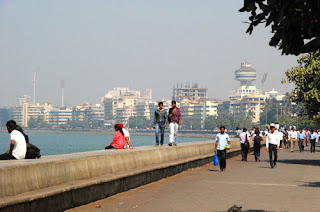 |
| Marine Drive High Rises - South Mumbai, India |
Marine
Drive: Real estate prices along this major tree-lined boulevard are among the
highest in India. Many restaurants and high-rise buildings line Marine Drive. At
the northern end is Chowpatty Beach
(see photo), a popular beach known for its local fast food. Most of the
buildings have an art deco look that was popular in the 1920’s and 1930’s. Miami
is the only city in the world that has more art deco buildings.
Prince
of Wales Museum (Chhatrapati
Shivaji Maharaj Vastu Sangrahalaya): The largest and best museum in Mumbai
houses approximately 50,000 exhibits of ancient Indian history.
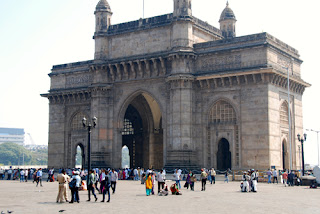 |
| Gateway of India - South Mumbai, India |
Some other of the sites in South Mumbai we
found to be just OK are: Mahalaxmi /
Jain Temple - if you have not visited a temple, this is one of the oldest in
Mumbai. Gateway of India (see photo)
is a monument built by the British. Flora
Fountain – good for drive-by, it was built in 1864 at the Martyr's Square (Hutatma
Chowk) and ornamentally sculpted. Mani
Bhavan - acted as the focal point of Gandhi's political activities in
Mumbai between 1917 and 1934. Hanging
Garden (Pherozeshah Mehta) - are
located in Malabar Hill are interesting but not well maintained.
The British built a magnificent city within the walls of Fort St. George, just south of South
Mumbai. Other excellent examples of colonial architecture from the British rule
can be found in the Mumbai University
buildings and the High Court.
This is a summary of our short but memorable visit to
Mumbai. There is much more to see and experience.
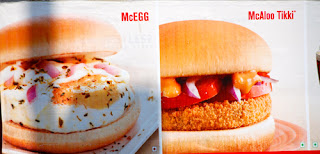 |
| McDonald's McAloo Tikki - Mumbai, India |
More about Mumbai... Mumbai, formally
known as Bombay until 1996,
is the most populous city in India and the fourth most in the world with a
metropolitan population of about 21 million. It is the commercial and
entertainment capital of India. Mumbai is one of the top 10 commerce centers in
the world generating 5% of India's GDP, 25% of its industrial
output, and 70% of the India’s capital transactions. Mumbai’s deep
natural harbor makes it one of the predominant port cities in the country with
70% of India’s maritime trade.
 |
| Colors of India! |
Travel tips... Mumbai has three main seasons - hot
and humid Summer (March to May), Monsoon (June to September), and Winter
(milder summer). The best time to visit is during the winter between November
and February. The weather was wonderful when we visited in February. Locals in
Mumbai can manage to speak in broken English and those working in corporates
and belonging to middle, upper middle and high class can speak fluent English.
Because of
our short stay in Mumbai, we stayed at the nice affordable Hotel Bawa
International hotel near Mumbai’s domestic airport. The Club Rooms are very
nice and the staff is helpful. Hiring a driver for a tour of South Mumbai can
be arranged. We liked the Green House Indian restaurant about 15 minute
walk from the hotel. If we stayed longer in Mumbai, we would have considered
staying in South Mumbai where more of the tourist sites are located.
Staying healthy in India... Most visitors choose bottled water that can be
purchased reasonable cheaply. When buying water from street vendors, make sure
the lid is sealed and not refilled with tap water. Make sure you rinse your
toothbrush with bottled water and keep your mouth closed when showering. It is
also wise to be careful what you eat. Outside of major tourist hotels and
restaurants, particularly risky things to stay away from are raw leafy
vegetables and egg-based dressings like mayonnaise, and minced meat. To be
safe, you should stick to boiled, baked, fried, or peeled goods.
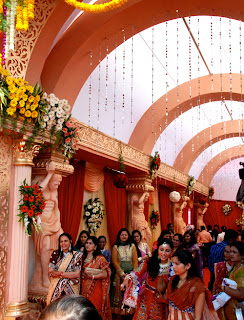 |
| Hindu Wedding - Mumbai, India |
Some history... Mumbai is
made up a seven islands. Modern history of Mumbai started in 1498 when the
Portuguese took over and later handed it over to England in 1661, who leased
the islands to the East India Company. They built the docks, the trading posts,
and the fort that would become the center of the city transforming Bombay (now
called Mumbai) into a major seaport on the Arabian Sea. They also started off
the long process of reclaiming land joining the islands, which went on until
the 1960’s. The port attracted industries and successive waves of migration.
The last British troops left India following India’s independence in 1948. In
the 1980’s, high labor costs and unrest forced the closure of many textile
mills and the city went into a decline from which it started recovering in the
late 1990’s.
Please see our other 6 travel blog posts about incredible India:
Taj Mahal, India
Goa Beaches, India
Cremations on Ganges River - Varanasi, India
New Delhi, India (Capital)
Khajuraho (Kama Sutra Temples) - Orchha, India
Jaipur (The Pink City), India
Please see our other 6 travel blog posts about incredible India:
Taj Mahal, India
Goa Beaches, India
Cremations on Ganges River - Varanasi, India
New Delhi, India (Capital)
Khajuraho (Kama Sutra Temples) - Orchha, India
Jaipur (The Pink City), India

Please enjoy 250+ wonderful places around the world, with award-winning photos, from our BLOG ARCHIVE on the right ---->
Travel for half the cost for all levels of travel from budget to luxury and 100's of other unique travel tips! From a
former Economic professor, experienced traveler
(106 countries), award-winning travel photojournalist/blogger, featured speaker at large travel shows,
host of the travel TV show Plan Your Escape® TV aired on the CW network,
and travel columnist for the Huffington Post, our
popular 5-star customer rated groundbreaking and comprehensive how-to world travel book Plan Your Escape, Secrets of Traveling the World for Less Than the Cost of Living at Home reveals secrets how you can travel and see
more for half the cost for all trips from weekend getaways to longer vacations
and trips, experience more adventure and romance, safely realize your travel
dreams with comprehensive planning tools and checklists, travel the world for
less than $100/day for a couple, and much more!



Hey...it is great to see a post on the city that we live in! I am glad that you saw an Indian wedding. It is a riot of colours - isn't it?
ReplyDeleteHere is a link to our blog that might remind you of your stay in Mumbai!
http://tickingthebucketlist.blogspot.in/2014/10/south-mumbai-tourism-in-our-own-city.html